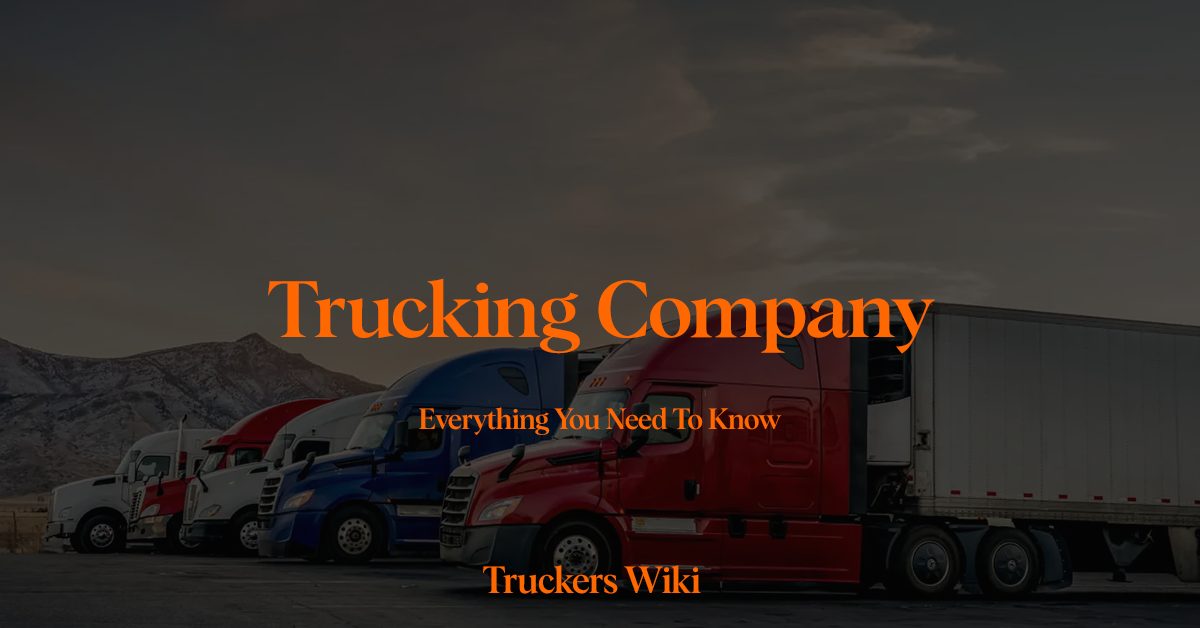
Table of Contents
What Is a Trucking Company
A trucking company, also known as a carrier or freight company, is a business entity that offers transportation services for cargo using trucks as the primary mode of delivery.
These companies serve as freight movers for shippers, who need to transport goods.
Functions of a Trucking Company
Freight Transportation
The primary function of a trucking company is to transport freight from one location to another. This can involve hauling goods locally, regionally, or across the country, depending on the scope of operations and service areas.
Logistics Management
Trucking companies often provide logisticcas management services, including coordinating and planning the movement of goods, optimizing routes, and ensuring timely deliveries. They utilize technology and expertise to streamline operations and improve efficiency.
Equipment and Fleet Management
Trucking companies maintain and manage a fleet of trucks, trailers, and other equipment necessary for transportation. They ensure the vehicles are well-maintained, comply with safety standards, and meet the specific needs of different types of cargo.
Load Consolidation
Many trucking companies offer load consolidation services, where they combine multiple shipments from different customers into a single truckload. This optimizes capacity utilization and reduces costs for both the carrier and the shipper.
Customer Service
A reputable trucking company prioritizes exceptional customer service. They handle inquiries, provide tracking information, and address any concerns or issues that arise during the transportation process. Good communication and responsiveness are key aspects of their service.
Significance of Trucking Companies
Trucking companies are an integral part of the overall supply chain and play a vital role in the economy. Here are some reasons why they are significant:
Efficient Goods Distribution
Trucking companies facilitate the movement of goods from manufacturers to distributors, retailers, and consumers, ensuring a steady supply of products across different locations.
Job Creation
The trucking industry provides employment opportunities for a significant number of individuals, including truck drivers, mechanics, dispatchers, safety officers and managers, recruiters, accountants, logistics coordinators, and administrative staff.
Economic Growth
Trucking companies contribute to economic growth by supporting trade and commerce. They enable businesses to expand their market reach and connect regions through the transportation of goods.
Flexible and Versatile
Trucking offers flexibility in terms of delivery schedules, route options, and the ability to transport various types of cargo, including perishable goods, hazardous materials, and oversized loads.
Supporting Other Industries
Trucking companies provide essential services to various sectors such as manufacturing, retail, construction, and agriculture, enabling these industries to function smoothly by ensuring the timely delivery of raw materials, supplies, and finished products.
Structure Of a Trucking Company
Let’s outline how different roles and responsibilities are assigned, how departments or divisions are structured, and how communication and decision-making flow within the organization. Here is a typical structure commonly found in trucking companies:
Executive Leadership
At the top of the organizational structure, you have the executive leadership team, which includes positions such as the CEO, President, and other high-level executives.
Operations Department
The operations department oversees the day-to-day activities of the trucking company. This department is responsible for managing the fleet, dispatching trucks, planning routes, scheduling deliveries, and ensuring efficient operations. It includes roles such as Operations Manager, Dispatchers, Fleet Managers, and Load Planners.
Safety and Compliance
Given the importance of safety in the trucking industry, trucking companies typically have a dedicated department or team focused on safety and compliance. This team ensures that all operations adhere to local, state, and federal regulations related to trucking, including driver qualifications, vehicle maintenance, hours-of-service rules, and safety protocols.
Finance and Accounting
The finance and accounting department manages the financial aspects of the trucking company. They handle financial planning, budgeting, accounts payable and receivable, payroll, tax compliance, and financial reporting. This department may include positions such as Chief Financial Officer (CFO), Accountants, and Financial Analysts.
Human Resources
The human resources department takes care of the company’s workforce. They handle employee recruitment, hiring, onboarding, training and development, benefits administration, employee relations, and compliance with employment laws and regulations. Positions within HR may include HR Manager, Recruiters, and HR Specialists.
Maintenance and Repair
The maintenance and repair department is responsible for ensuring the proper maintenance and upkeep of the company’s fleet. They perform routine inspections, schedule maintenance services, handle repairs, and ensure compliance with vehicle safety standards. This department may include mechanics, technicians, and maintenance supervisors.
Sales and Customer Service
In larger trucking companies, there may be a dedicated sales and customer service department responsible for acquiring new customers, maintaining existing relationships, and addressing customer inquiries or concerns. This team works closely with shippers, brokers, and clients to understand their transportation needs and provide solutions.

